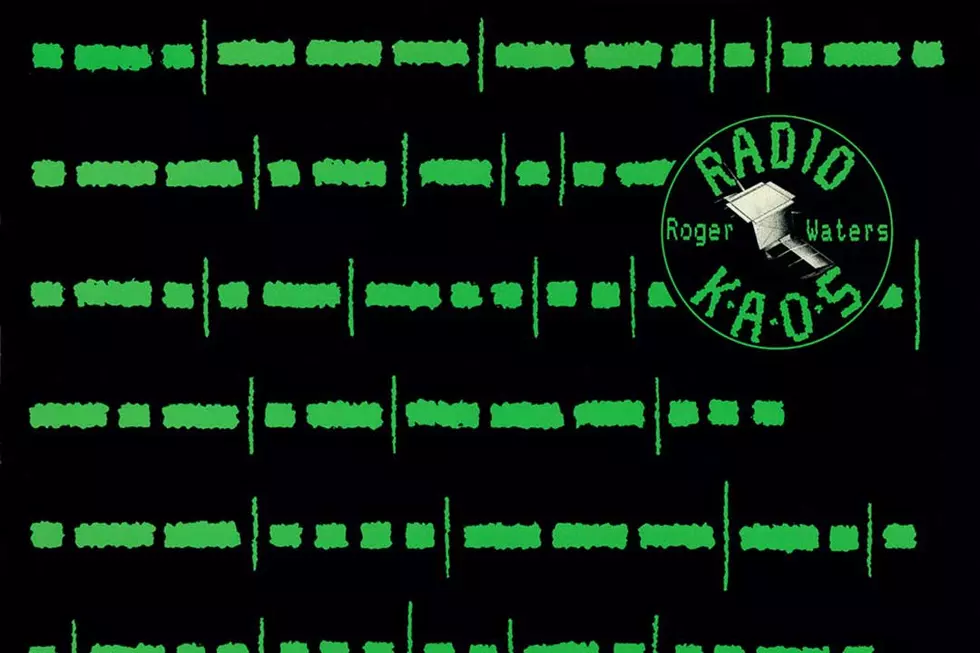
35 Years Ago: Roger Waters Breaks Up ‘Radio K.A.O.S.’ to No Avail
Radio K.A.O.S. had an often-impenetrable theme, but Roger Waters – and his label – clearly thought a shift to more era-friendly sequencer- and synth-based sounds would pay chart dividends.
"CBS Records is saying there are three potential hit singles on it – which would be very weird for me, since I've only had two hits in my whole life," Waters told the Los Angeles Times in 1987, with a laugh. "But then again, they may be wrong."
They were. "Sunset Strip" arrived on Sept. 12, 1987, as the second of those singles, and like the others, it failed to chart on the Billboard Hot 100. None of the four released songs finished in the U.K. Top 40 either. A poorly selling tour in support of Radio K.A.O.S. went on to lose money in droves.
His followers simply didn't connect with a convoluted plot involving displaced coal miners, a palsy sufferer who could channel radio waves, a rogue disc jockey trying to hold onto a dying format and, toward the end, a potentially catastrophic simulation of World War III.
Even back then, Waters seemed weary with trying to explain how it all came together. "I'm not going to talk about the plot of the record," he said in another contemporary interview, "and I'll tell you why: because it sounds crazed – and it is mildly crazed if I start describing it."
In the end, Radio K.A.O.S. wanted to be about miscommunication, monetarism and how mass media can let us down. So a looming, radio-unfriendly portent ran through the album. Its narrative complexity also tended to make bite-sized singles a rather bewildering experience.
No amount of DX7, Fairlight or E-mu programming was going to fix that. And it certainly wasn't going to magically transform these songs into hit singles.
"Between [co-producer] Ian Ritchie and myself, we really fucked that record up," Waters admitted in Pigs Might Fly: The Inside Story of Pink Floyd. "We tried too hard to make it sound modern. I allowed myself to get pushed down roads that were uncomfortable for me. I should never have made that record."
Watch Roger Waters' Video for 'Sunset Strip'
"Sunset Strip" arrives as song-cycle protagonist Billy, the wheelchair-using paraplegic boy from Wales, is sent to Los Angeles to live with a relative. He takes some comfort in calling into a radio show helmed by real-life DJ Jim Ladd, and the song discusses his arrival in America – and what Billy misses about home.
In a curious moment, they eventually begin talking about Billy's distaste for various kinds of fish, of which there are many. Ladd pushes Billy to make a song request, assuming that's why he called in. But Billy presses on: "My least-hated, favorite fish would be sole. That way you don't have to see the eyes," Billy says with the aid of a computer-generated voice assistant. "Sole has no eyes."
These interactions were recorded at Waters' home studio and were largely unscripted, Ladd told the Times. "We did about two hours of material, virtually all improvised – just off the top of our heads," he said. "Roger knew what he wanted to get, but he didn’t script it out because wanted it as real and gut-level as possible."
That sounds a lot more fun than it was. The song's lithe groove and laughing DJ stand in contrast to its lonesome narrative, and the concluding conversation is both deeply weird and rather dark – especially the implication found in Waters' final double entendre about the sole.
Billy becomes increasingly isolated, even as he begins to realize more about his powers – and how he might use them for the greater good. Hoping to scare the world into peace accords, Billy very nearly triggers Armageddon later on when he can't reach Ladd, using the same phone to hack into competing nuclear-weapon systems. The tragedy is only narrowly averted.
Of course, "Sunset Strip" can't connect all of those dots. Who is this boy? Why is calling Ladd? What's he got against trout? These things are not explained, and cannot be, in a single song. The larger issues are barely explained across the whole of Radio K.A.O.S., a point that Waters seemed to concede by including a libretto in the packaging that tried to put things in perspective.
These dangers were quite real – and not just the end-of-the-world War Games-esque stuff. In a moment of sad irony, Ladd lost his real-life job as Waters' LP was being completed when the L.A. rock station KMET was switched to an automated New Age format.
But a radio single just wasn't the place to tell that story either.
Weird Facts About Rock's Most Famous Album Covers
When Alice Cooper Got Stoned with Pink Floyd


